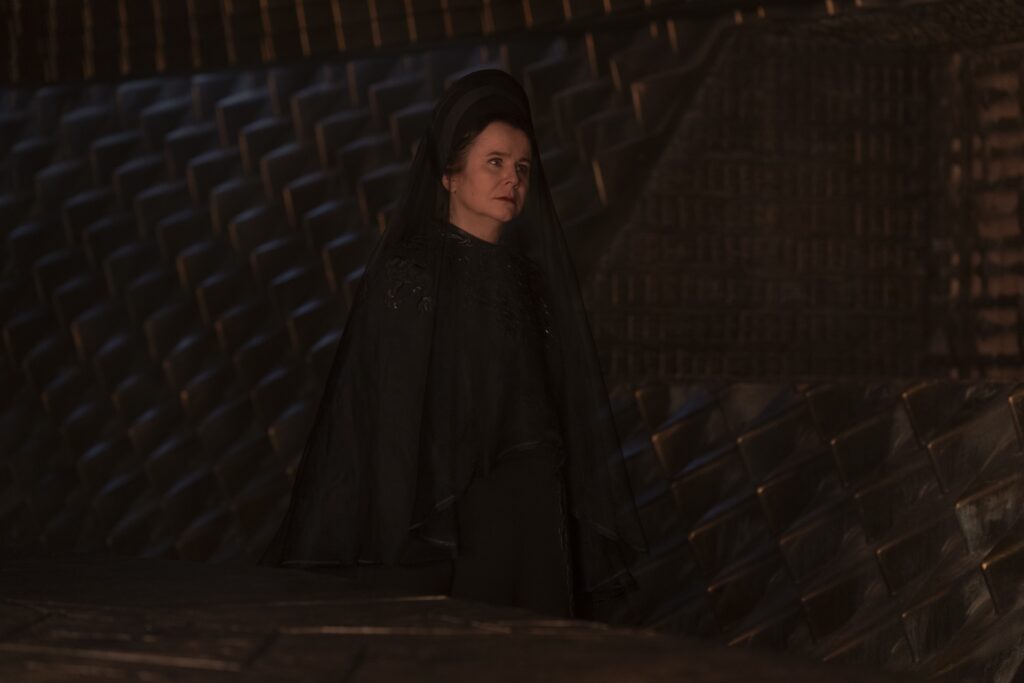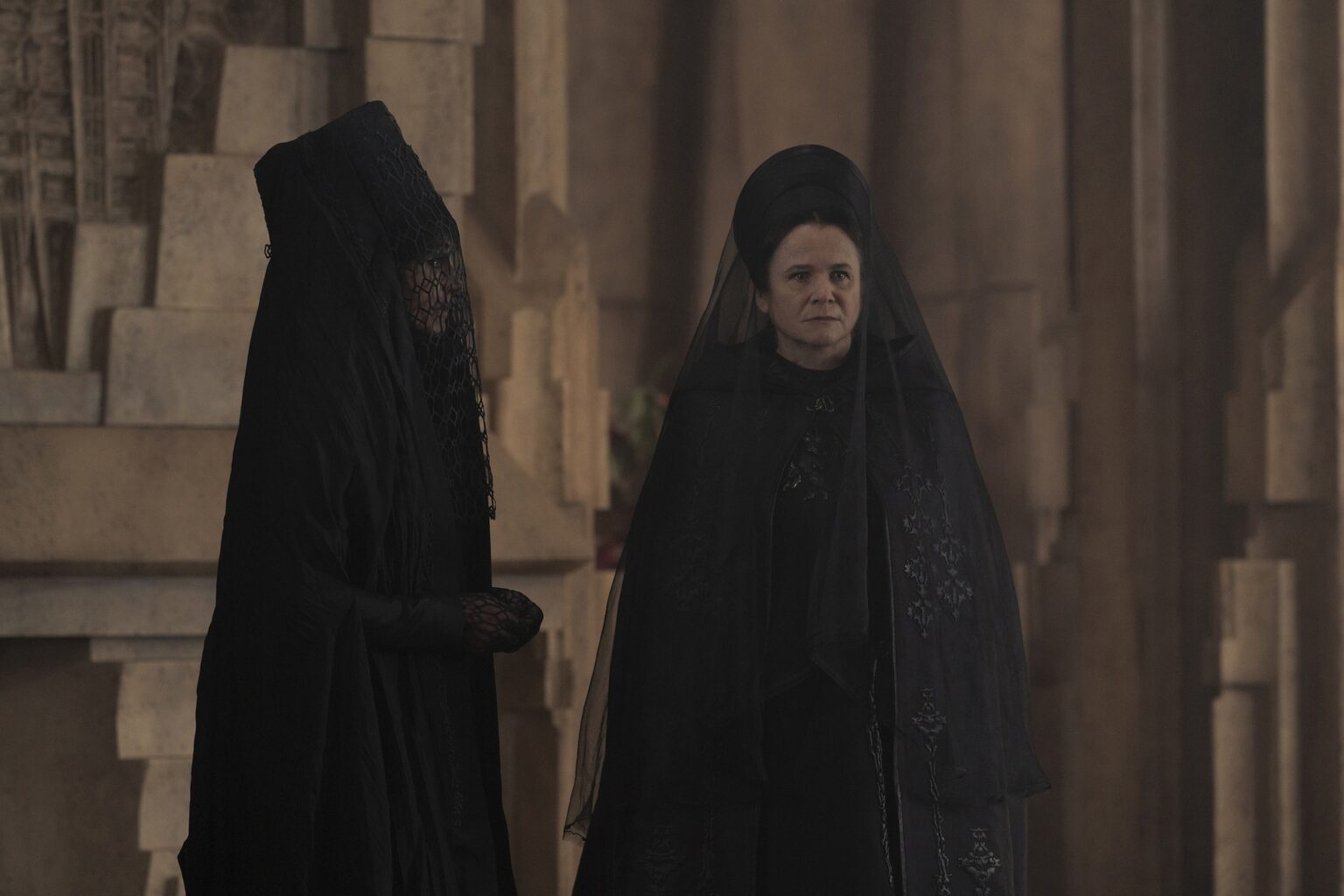As we sink deeper into the windswept sands of Dune: Prophecy, the world—and its players—are starting to take shape. Sunday night’s episode cracked open the motives and personalities of our core characters, offering a closer look at Ynez, Constantine (Jon Snow parallel, anyone?) their relationships with their parents, succession dynamics, and personal complexes.
We also got a sharper glimpse of Valya and Tula’s electric sibling dynamic—volatile, intimate, and their motives.
The series is clearly playing the long game with its sprawling cast and layered relationships, but for now, all eyes should be on Valya.
As the plot thickens, Valya’s cold determination raises questions about her true motives—and what she’s really fighting for.
Mother Superior
In Episode 2, Valya’s iron grip over the Sisterhood—and her unrelenting ambition—takes center stage. Determined to see her plans through, she pushes forward with the arranged marriage between Pruwet and Ynez, brushing off Kasha’s warnings. It’s a calculated risk that reveals just how far Valya is willing to go to solidify power, even as the consequences simmer beneath the surface.
This ruthless pragmatism puts her in constant conflict with her sister, Tula. Where Valya commands with a Machiavellian sense of duty, always prioritizing results over sentiment. Meanwhile, Tula leads with raw emotion, a stark contrast that fuels their ongoing clash over how best to control the Sisterhood. Their dynamic is a power struggle in motion.
Tula’s emotions simmer to the surface when Lila faces the Agony—a ritual designed to connect with Mother Raquell—exposing the deep rift in their opposing approaches to leadership.
Tula’s vulnerability manifests in sullen insecurity, while Valya channels her emotions into a tightening grip on power. The episode opens with Valya, shaken by news of Pruwet’s death mirroring Kasha’s fate, looking increasingly unhinged and ruthless.
When Valya executes Dorotea or issues thinly veiled threats, she always maintains an air of cold composure—her presence polished, unshaken.
Even as Kasha lay dying before her, she seems collected at first, only slipping into a manic fervor when she interprets the moment as vindication of Mother Raquell’s vision.
Yet none of those moments compare to the frenzied state we see when her sister informs her of Pruwet’s death. It’s not the child’s murder that unravels her; it’s the threat this poses to the Sisterhood’s carefully laid plans.
Valya’s hair, usually tucked into a pristine bun, was disheveled, loose strands flying about—a visual crack in her typically composed exterior. Her voice carries a newfound emotional intensity, a departure from the stoic demeanor she so carefully wielded in every interaction.
Valya’s Enigmatic Energy
There’s something about Valya—beyond her relentless scheming and unapologetic crimes—that’s unsettling and untrustworthy. She radiates the unmistakable energy of someone destined to be the villain in their own story.
And yet, there’s something equally compelling and enigmatic about her.

Her strength lies in her unflinching ability to make brutal decisions and stay focused on the endgame. Valya may do awful things, but much like Thanos, her motives are rooted in a twisted sense of logic—understandable, even if you don’t agree with them. In her eyes, the wreckage along the way is nothing more than collateral damage if it means the Sisterhood can claim the throne. Her choices are steeped in a pursuit of power that ultimately serves the Sisterhood’s survival.
On the other hand, at face value, she’s not doing it selfishly—but on behalf of all of them. She believes she’s fighting for the future of her people, her Sisters, determined to keep them alive, protected, and well positioned in a cut-throat universe that demands sacrifices—sacrifices she has the strength and mental fortitude to make.
But that’s the unnerving part. Are those her true motives? Or simply a moral cloak she wears to disguise her own cold-blooded pursuit of power? Her strained confrontations with the more empathetic sisters, (and at times, the ominous score behind her most callous acts) leave the viewer wondering: Are her decisions are driven by an unyielding ambition for personal power and control, or are they truly in service of the Sisterhood?
After all, if the Sisterhood ascends to the throne, as the de facto leader, it is Valya who would take her place upon it.
A Leader or A Villain?
Is she a villain? Not exactly. Valya is a complex character, driven by questionable motives and extreme methods. As the show unfolds, we’ll see just how far she’s willing to go—and whether the ends will ultimately justify the means.
This show is full of incredible characters, but Valya stands out. She’s unflinchingly determined to do whatever it takes to secure her future and protect those who will follow.
While Valya might eventually prove herself a formidable leader or villain for now, she remains a morally ambiguous character who adds rich complexity to the story.
This article is for informational purposes only. Trendy Matters has no affiliation with any of the brands or individuals mentioned. The views expressed in this article are solely those of the author. The author and Trendy Matters do not receive any compensation for any of the links in this article.


